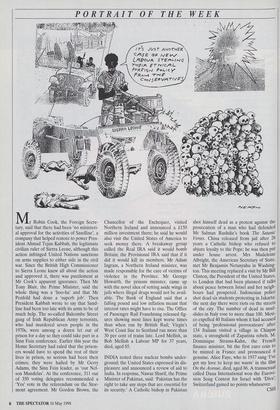PORTRAIT OF THE WEEK
M
r Robin Cook, the Foreign Secre- tary, said that there had been `no ministeri- al approval for the activities of Sandline', a company that helped restore to power Pres- ident Ahmad Tejan Kabbah, the legitimate civilian ruler of Sierra Leone, although this action infringed United Nations sanctions on arms supplies to either side in the civil war. Since the British High Commissioner to Sierra Leone knew all about the action and approved it, there was puzzlement at Mr Cook's apparent ignorance. Then Mr Tony Blair, the Prime Minister, said the whole thing was a 'hoo-ha' and that Mr Penfold had done a 'superb job'. Then President Kabbah wrote to say that Sand- line had been too late with its arms to be of much help. The so-called Balcombe Street gang of Irish Republican Army terrorists, who had murdered seven people in the 1970s, were among a dozen let out of prison for a day so they could take part in a Sinn Fein conference. Earlier this year the Home Secretary had ruled that the prison- ers would have to spend the rest of their lives in prison, so serious had been their crimes; they were hailed by Mr Gerry Adams, the Sinn Fein leader, as 'our Nel- son Mandelas'. At the conference, 311 out of 350 voting delegates recommended a `Yes' vote in the referendum on the Stor- mont agreement. Mr Gordon Brown, the Chancellor of the Exchequer, visited Northern Ireland and announced a £150 million investment there; he said he would also visit the United States of America to seek money there. A breakaway group called the Real IRA said it would bomb Britain; the Provisional IRA said that if it did it would kill its members. Mr Adam Ingram, a Northern Ireland minister, was made responsible for the care of victims of violence in the Province. Mr George Howarth, the prisons minister, came up with the novel idea of setting aside wings in jails where illegal drugs would not be avail- able. The Bank of England said that a falling pound and low inflation meant that interest rates might have to rise. The Office of Passenger Rail Franchising released fig- ures showing most lines kept worse times than when run by British Rail; Virgin's West Coast line to Scotland ran more than 30 per cent of trains late. Lord Mellish, as Bob Mellish a Labour MP for 37 years, died, aged 85.
INDIA tested three nuclear bombs under- ground; the United States expressed its dis- pleasure and announced a review of aid to India. In response, Nawaz Sharif, the Prime Minister of Pakistan, said: 'Pakistan has the right to take any steps that are essential for its security.' A Catholic bishop in Pakistan shot himself dead as a protest against the prosecution of a man who had defended Mr Salman Rushdie's book The Satanic Verses. China released from jail after 26 years a Catholic bishop who refused to abjure loyalty to the Pope; he was then put under house arrest. Mrs Madeleine Albright, the American Secretary of State, met Mr Benjamin Netanyahu in Washing- ton. This meeting replaced a visit by Mr Bill Clinton, the President of the United States, to London that had been planned if talks about peace between Israel and her neigh- bours had prospered. Indonesian police shot dead six students protesting in Jakarta; the next day there were riots on the streets of the city. The number of dead in mud- slides in Italy rose to more than 100. Mexi- co expelled 40 Italians whom it had accused, of being 'professional provocateurs' after' 134 Italians visited a village in Chiapas state, a stronghold of Zapatista rebels. M. Dominique Strauss-Kahn, the French finance minister, bit the first euro coin to be minted in France and pronounced it genuine. Alice Faye, who in 1937 sang I've got my love to keep me warm' in the film On the Avenue, died, aged 86. A transsexual called Dana International won the Eurovi- sion Song Contest for Israel with 'Diva% Switzerland gained no points whatsoever.
CSH


























































 Previous page
Previous page